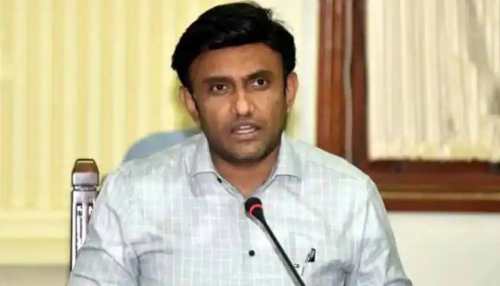- News>
- Karnataka
Karnataka Minister K Sudhakar defends `modern Indian women` remark, says based on survey

Karnataka Health Minister K Sudhakar issued clarification on his `modern women in India` remark and said he had `no intention to single out women`.
Highlights
- Sudhakar had said that modern Indian women want to stay single and married ones don't want to give birth.
- Sudhakar was slammed by many for his statement.
New Delhi: After raking up controversy with his remarks on “modern Indian women”, Karnataka Health Minister Dr K Sudhakar on Monday (October 11) defended his statement and said it was “based on a survey and a small part of speech was taken out of context”.
Sudhakar during the World Mental Health Day event on Sunday at the National Institute of Mental Health and Neurological Sciences (NIMHANS), had said, "Today, I am sorry to say this, lots of modern women in India want to stay single. Even if they get married, they don't want to give birth. They want surrogacy. So there is a paradigm shift in our thinking, which is not good."
His remarks were slammed by many on social media as well as women's organizations leading to which he issued a clarification on Monday and said, "It is unfortunate that a small part of my address out of the nineteen and a half minutes long speech during the World Mental Health Day programme at NIMHANS on Sunday is taken out of context and thereby losing out on the larger point I was trying to make at the prestigious National Institute of Mental Health and Neurosciences."
The Karnataka Health Minister claimed his statement was based on findings of the YouGov-Mint-CPR Millennial Survey. "The findings of YouGov-Mint-CPR Millennial Survey shows that, among millennials, 19 per cent aren`t interested in either children or marriage. Another 8 per cent want children but are not interested in marriage. Among post-millennials (or Gen Z adults), 23 per cent aren`t interested in either children or marriage. As in the case of millennials, 8 per cent want children but are not interested in marriage. There are very little gender-wise differences in these trends. It is applicable to both boys and girls," ANI quoted the BJP minister as saying.
Further, he said that being a father of a daughter and medical doctor by training, he “understood the sensitivities around women and also the mental health issues”. Sudhakar said that the Indian joint family which follows “principles of collectivism” has proved to be an "excellent resource for the care of the mentally ill”.
The Indian and Asian families are, therefore, far more involved in caring for their members, he added.
Sudhakar asserted that he had no intention to single out women but was only trying to convey that youth can resort to traditional families for a support system in case of mental health issues. “The only point I was trying to convey was that our youth can find solution and solace to mental health issues in our traditional family and its value system which offers a wonderful support system. I had no intention to single out women nor did my words mean so,” the state health minister said.
Several women's organizations had condemned Sudhakar’s statement, pointing out that women are free to decide whether to have a child or not. Equal rights activist Brinda Adige had told IANS that Sudhakar's statement is "sexist, patriarchal, and unbecoming of a minister”.
(With agency inputs)
